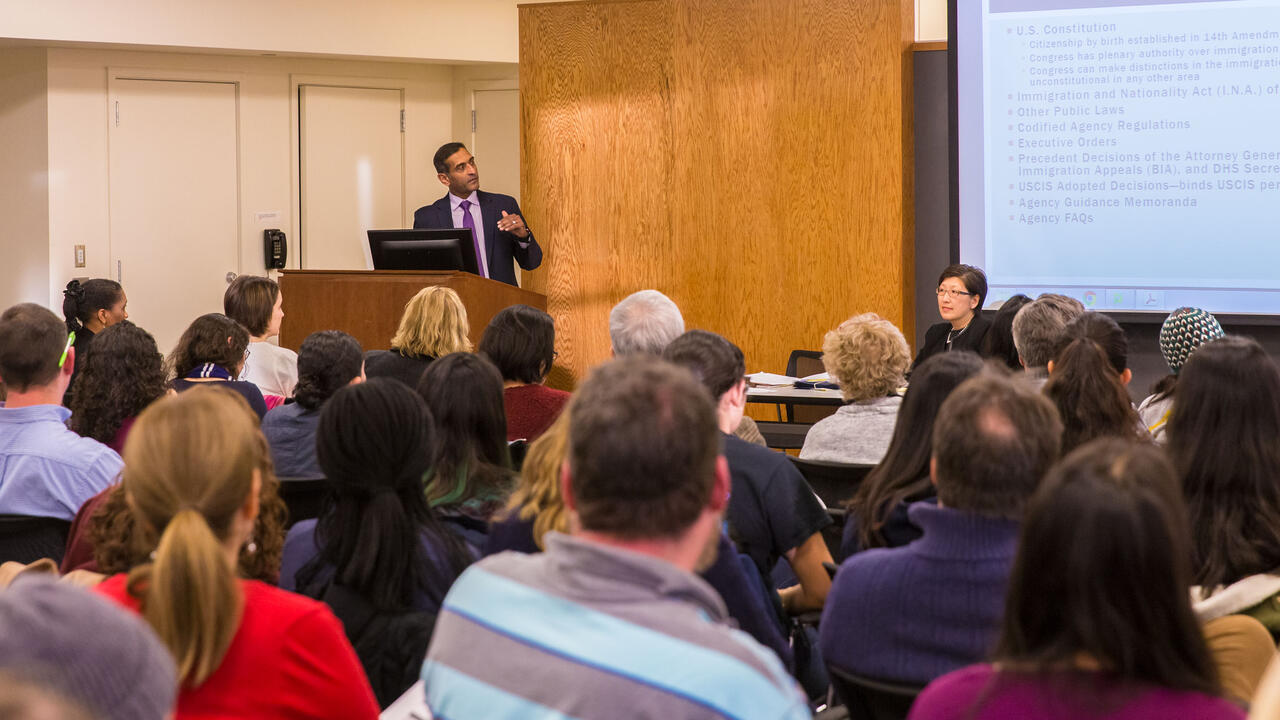College Town Hall Meeting Offers Clarity on U.S. Immigration Law

On December 9, Wellesley College hosted a town hall meeting to offer clarity, provide legal information, and discuss what the future might hold for U.S. immigration law. This was the second in a series of town hall meetings on this issue. Last month, Joy St. John, dean of admission and financial aid, held a town hall meeting to provide information about Wellesley’s admission and aid policies for undocumented students. In the most recent meeting, Prasant Desai and Madeline Cronin, partners in the Boston-based law firm Iandoli Desai & Cronin P.C., which specializes in immigration law, presented an overview. We asked them about the current state of immigration law and what changes might be anticipated under the new administration.
Q1: What is the current immigration landscape?
Prasant Desai (PD) & Madeline Cronin (MC):
U.S. immigration law is complex. However, the law entitles all individuals (regardless of immigration status) living in the United States due process. What that means is no one can be deported or stripped of status or deported without a court hearing. Also remember that any individual detained or arrested has the right to an attorney. Unlike criminal law, the U.S. Constitution does not have to provide an attorney in deportation (or removal proceedings). Keep in mind that immigration courts have multiyear backlogs. The only time someone may not have a hearing is if he or she was previously ordered deported and did not leave the United States.
Q2: How do you see immigration law changing under the Trump administration?
PD & MC:
The most immediate change could be to eliminate or change DACA (Deferred Action for Childhood Arrivals). DACA is not an executive order but rather stems from the Department of Homeland Security secretary’s memoranda to the three sub-agencies within DHS, ICE (Immigration and Customs Enforcement), CBP (Customs Border Protection), and USCIS (U.S. Citizenship and Immigration Services), on proper exercise of prosecutorial discretion, which has allowed certain undocumented immigrants who entered the United States as minors to receive a renewable two-year period of deferred action from deportation.
Therefore, DACA is not actually an “executive order.” On the president-elect’s transition website, it states the Trump administration will “cancel unconstitutional executive orders and enforce all immigration laws.” Most recently, President-Elect Donald Trump also told Time magazine for its profile of him as “Person of the Year” that while he wasn’t prepared to back off his pledge to end DACA, he wanted to find a compromise, saying, “We’re going to work something out that’s going to make people happy and proud. They got brought here at a very young age, they’ve worked here, they’ve gone to school here. Some were good students. Some have wonderful jobs. And they’re in never-never land because they don’t know what’s going to happen.”
We will have to wait and see what develops.
Q3: What are some resources for individuals and families with questions or concerns?
PD & MC:
Many people who are undocumented are afraid to seek help. We encourage anyone with questions or concerns about their immigration status to obtain good information and to reach out to the many resources available. We recommend www.immigrationlawhelp.org, PAIR Project at 617-742-9296, the ACLU at 617-482-3170, ext. 100, MIRA at 617-350-5480, and Catholic Charities at 617-464-8100. Beware of notarios, those that are not authorized to practice law. If you have any doubts, contact the state bar association to determine if the attorney who is helping you is authorized to practice law, has any registered complaints, etc.



